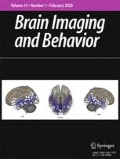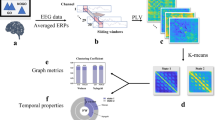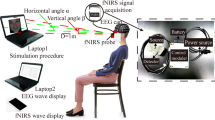Abstract
Executive function is a complex involving multiple advanced brain functions like planning, working memory, mental flexibility and psychomotor. Previous researches indicated that executive function may be impaired after acute or chronic high-altitude exposure, while the underlying neurobiological mechanism has not been totally clarified. In the present study, based on 69 young healthy volunteers immigrating to high-altitude, Stroop test was utilized to identify the potential impairment of executive function after two-year high-altitude exposure while resting-state functional MRI (rs-fMRI) technology was employed to observe the alteration of resting-state networks. Stroop test indicated that the subjects experienced significantly lower accuracies and prolonged responding time after two-year exposure. Resting-state network analysis displayed a significantly decreased degree of co-activation within the left/right frontoparietal network, sensorimotor network, and auditory network after exposure. In the frontoparietal network, decreased co-activation intensity was found in left angular gyrus, while in the right frontoparietal network, decreased co-activation intensity was found in left precentral gyrus and postcentral gyrus. Similarly, as for sensorimotor and auditory network, left middle frontal gyrus and left superior temporal gyrus was identified to have decreased co-activation, respectively. Moreover, the responding delays in ST (part II) were negatively correlated with the signal intensity alteration of the right frontoparietal network. All these evidences indicated that the high-altitude exposure induced alteration in above resting state networks may be the functional basis of executive control impairment.




Similar content being viewed by others
References
Beckett, J. S., Brooks, E. D., Lacadie, C., Vander Wyk, B., Jou, R. J., Steinbacher, D. M., et al. (2014). Altered brain connectivity in sagittal craniosynostosis. Journal of Neurosurgery. Pediatrics, 13(6), 690–698. https://doi.org/10.3171/2014.3.peds13516.
Boord, P., Madhyastha, T. M., Askren, M. K., & Grabowski, T. J. (2017). Executive attention networks show altered relationship with default mode network in PD. Neuroimage Clin, 13, 1–8. https://doi.org/10.1016/j.nicl.2016.11.004.
Bossong, M. G., Jansma, J. M., van Hell, H. H., Jager, G., Kahn, R. S., & Ramsey, N. F. (2013). Default mode network in the effects of Delta9-Tetrahydrocannabinol (THC) on human executive function. PLoS One, 8(7), e70074. https://doi.org/10.1371/journal.pone.0070074.
Cabral, J., Kringelbach, M. L., & Deco, G. (2014). Exploring the network dynamics underlying brain activity during rest. Progress in Neurobiology, 114, 102–131. https://doi.org/10.1016/j.pneurobio.2013.12.005.
Chen, X., Zhang, Q., Wang, J., Liu, J., Zhang, W., Qi, S., et al. (2017). Cognitive and neuroimaging changes in healthy immigrants upon relocation to a high altitude: A panel study. Human Brain Mapping, 38(8), 3865–3877. https://doi.org/10.1002/hbm.23635.
Cotrena, C., Branco, L. D., Shansis, F. M., & Fonseca, R. P. (2016). Executive function impairments in depression and bipolar disorder: Association with functional impairment and quality of life. Journal of Affective Disorders, 190, 744–753. https://doi.org/10.1016/j.jad.2015.11.007.
Davis, J. E., Wagner, D. R., Garvin, N., Moilanen, D., Thorington, J., & Schall, C. (2015). Cognitive and psychomotor responses to high-altitude exposure in sea level and high-altitude residents of Ecuador. Journal of Physiological Anthropology, 34, 2. https://doi.org/10.1186/s40101-014-0039-x.
Davranche, K., Casini, L., Arnal, P. J., Rupp, T., Perrey, S., & Verges, S. (2016). Cognitive functions and cerebral oxygenation changes during acute and prolonged hypoxic exposure. Physiol Behav, 164(Pt A), 189–197. https://doi.org/10.1016/j.physbeh.2016.06.001.
Del Casale, A., Rapinesi, C., Kotzalidis, G. D., De Rossi, P., Curto, M., Janiri, D., et al. (2016). Executive functions in obsessive-compulsive disorder: An activation likelihood estimate meta-analysis of fMRI studies. The World Journal of Biological Psychiatry, 17(5), 378–393. https://doi.org/10.3109/15622975.2015.1102323.
Dixon, M. L., De La Vega, A., Mills, C., Andrews-Hanna, J., & Spreng, R. N. (2018). Heterogeneity within the frontoparietal control network and its relationship to the default and dorsal attention networks. 115(7), E1598-e1607. https://doi.org/10.1073/pnas.1715766115.
Dong, G., Lin, X., & Potenza, M. N. (2015). Decreased functional connectivity in an executive control network is related to impaired executive function in internet gaming disorder. Progress in Neuro-Psychopharmacology & Biological Psychiatry, 57, 76–85. https://doi.org/10.1016/j.pnpbp.2014.10.012.
Gaudio, S., Wiemerslage, L., Brooks, S. J., & Schioth, H. B. (2016). A systematic review of resting-state functional-MRI studies in anorexia nervosa: Evidence for functional connectivity impairment in cognitive control and visuospatial and body-signal integration. Neuroscience and Biobehavioral Reviews, 71, 578–589. https://doi.org/10.1016/j.neubiorev.2016.09.032.
Gratton, C., Sun, H., & Petersen, S. E. (2018). Control networks and hubs. Psychophysiology, 55(3). https://doi.org/10.1111/psyp.13032.
Igelstrom, K. M., & Graziano, M. S. A. (2017). The inferior parietal lobule and temporoparietal junction: A network perspective. Neuropsychologia, 105, 70–83. https://doi.org/10.1016/j.neuropsychologia.2017.01.001.
Jurado, M. B., & Rosselli, M. (2007). The elusive nature of executive functions: A review of our current understanding. Neuropsychology Review, 17(3), 213–233. https://doi.org/10.1007/s11065-007-9040-z.
Kesler, S. R., Kent, J. S., & O'Hara, R. (2011). Prefrontal cortex and executive function impairments in primary breast cancer. Archives of Neurology, 68(11), 1447–1453. https://doi.org/10.1001/archneurol.2011.245.
Li, X., Liang, Y., Chen, Y., Zhang, J., Wei, D., Chen, K., et al. (2015). Disrupted Frontoparietal network mediates white matter structure dysfunction associated with cognitive decline in hypertension patients. The Journal of Neuroscience, 35(27), 10015–10024. https://doi.org/10.1523/jneurosci.5113-14.2015.
Llufriu, S., Martinez-Heras, E., Solana, E., Sola-Valls, N., Sepulveda, M., Blanco, Y., et al. (2017). Structural networks involved in attention and executive functions in multiple sclerosis. Neuroimage Clin, 13, 288–296. https://doi.org/10.1016/j.nicl.2016.11.026.
Mayer, A. R., Hanlon, F. M., Teshiba, T. M., Klimaj, S. D., Ling, J. M., Dodd, A. B., et al. (2015). An fMRI study of multimodal selective attention in schizophrenia. The British Journal of Psychiatry, 207(5), 420–428. https://doi.org/10.1192/bjp.bp.114.155499.
Moorhouse, P., Song, X., Rockwood, K., Black, S., Kertesz, A., Gauthier, S., & Feldman, H. (2010). Executive dysfunction in vascular cognitive impairment in the consortium to investigate vascular impairment of cognition study. Journal of the Neurological Sciences, 288(1–2), 142–146. https://doi.org/10.1016/j.jns.2009.09.017.
Moreira, H. S., Costa, A. S., Castro, S. L., Lima, C. F., & Vicente, S. G. (2017). Assessing executive dysfunction in neurodegenerative disorders: A critical review of brief neuropsychological tools. Frontiers in Aging Neuroscience, 9, 369. https://doi.org/10.3389/fnagi.2017.00369.
Ptak, R. (2012). The frontoparietal attention network of the human brain: Action, saliency, and a priority map of the environment. Neuroscientist, 18(5), 502–515. https://doi.org/10.1177/1073858411409051.
Pun, M., Guadagni, V., Bettauer, K. M., Drogos, L. L., Aitken, J., Hartmann, S. E., et al. (2018a). Effects on cognitive functioning of acute, subacute and repeated exposures to high altitude. Frontiers in Physiology, 9, 1131. https://doi.org/10.3389/fphys.2018.01131.
Pun, M., Hartmann, S. E., Furian, M., Dyck, A. M., Muralt, L., Lichtblau, M., et al. (2018b). Effect of acute, subacute, and repeated exposure to high altitude (5050 m) on psychomotor vigilance. Frontiers in Physiology, 9, 677. https://doi.org/10.3389/fphys.2018.00677.
Reineberg, A. E., & Banich, M. T. (2016). Functional connectivity at rest is sensitive to individual differences in executive function: A network analysis. Human Brain Mapping, 37(8), 2959–2975. https://doi.org/10.1002/hbm.23219.
Rimoldi, S. F., Rexhaj, E., Duplain, H., Urben, S., Billieux, J., Allemann, Y., et al. (2016). Acute and chronic altitude-induced cognitive dysfunction in children and adolescents. The Journal of Pediatrics, 169, 238–243. https://doi.org/10.1016/j.jpeds.2015.10.009.
Sanches, E. F., Arteni, N. S., Nicola, F., Boisserand, L., Willborn, S., & Netto, C. A. (2013). Early hypoxia-ischemia causes hemisphere and sex-dependent cognitive impairment and histological damage. Neuroscience, 237, 208–215. https://doi.org/10.1016/j.neuroscience.2013.01.066.
Schraegle, W. A., & Titus, J. B. (2016). Executive function and health-related quality of life in pediatric epilepsy. Epilepsy & Behavior, 62, 20–26. https://doi.org/10.1016/j.yebeh.2016.06.006.
Sharma, V. K., Das, S. K., Dhar, P., Hota, K. B., Mahapatra, B. B., Vashishtha, V., Kumar, A., Hota, S. K., Norboo, T., & Srivastava, R. B. (2014). Domain specific changes in cognition at high altitude and its correlation with hyperhomocysteinemia. PLoS One, 9(7), e101448. https://doi.org/10.1371/journal.pone.0101448.
Smith, S. M., Fox, P. T., Miller, K. L., Glahn, D. C., Fox, P. M., Mackay, C. E., et al. (2009). Correspondence of the brain's functional architecture during activation and rest. Proceedings of the National Academy of Sciences of the United States of America, 106(31), 13040–13045. https://doi.org/10.1073/pnas.0905267106.
Tao, L., Lin, H., Yan, Y., Xu, X., Wang, L., Zhang, J., & Yu, Y. (2017). Impairment of the executive function in breast cancer patients receiving chemotherapy treatment: A functional MRI study. Eur J Cancer Care (Engl), 26(6). https://doi.org/10.1111/ecc.12553.
van den Heuvel, M. P., & Hulshoff Pol, H. E. (2010). Exploring the brain network: A review on resting-state fMRI functional connectivity. European Neuropsychopharmacology, 20(8), 519–534. https://doi.org/10.1016/j.euroneuro.2010.03.008.
Vas, A., Chapman, S., Aslan, S., Spence, J., Keebler, M., Rodriguez-Larrain, G., et al. (2016). Reasoning training in veteran and civilian traumatic brain injury with persistent mild impairment. Neuropsychological Rehabilitation, 26(4), 502–531. https://doi.org/10.1080/09602011.2015.1044013.
Vassal, M., Charroud, C., Deverdun, J., Le Bars, E., Molino, F., Bonnetblanc, F., et al. (2017). Recovery of functional connectivity of the sensorimotor network after surgery for diffuse low-grade gliomas involving the supplementary motor area. Journal of Neurosurgery, 126(4), 1181–1190. https://doi.org/10.3171/2016.4.jns152484.
Virues-Ortega, J., Bucks, R., Kirkham, F. J., Baldeweg, T., Baya-Botti, A., & Hogan, A. M. (2011). Changing patterns of neuropsychological functioning in children living at high altitude above and below 4000 m: A report from the Bolivian children living at altitude (BoCLA) study. Developmental Science, 14(5), 1185–1193. https://doi.org/10.1111/j.1467-7687.2011.01064.x.
Wang, J., Wang, X., Xia, M., Liao, X., Evans, A., & He, Y. (2015). GRETNA: A graph theoretical network analysis toolbox for imaging connectomics. Frontiers in Human Neuroscience, 9, 386. https://doi.org/10.3389/fnhum.2015.00386.
Watermeyer, T. J., Brown, R. G., Sidle, K. C., Oliver, D. J., Allen, C., Karlsson, J., et al. (2015). Executive dysfunction predicts social cognition impairment in amyotrophic lateral sclerosis. Journal of Neurology, 262(7), 1681–1690. https://doi.org/10.1007/s00415-015-7761-0.
Yan, X., Zhang, J., Gong, Q., & Weng, X. (2011). Prolonged high-altitude residence impacts verbal working memory: An fMRI study. Experimental Brain Research, 208(3), 437–445. https://doi.org/10.1007/s00221-010-2494-x.
Yoo, K. M., Shin, H. K., Chang, H. M., & Caplan, L. R. (1998). Middle cerebral artery occlusive disease: The new England Medical Center stroke registry. Journal of Stroke and Cerebrovascular Diseases, 7(5), 344–351.
Zhang, J., Liu, H., Yan, X., & Weng, X. (2011). Minimal effects on human memory following long-term living at moderate altitude. High Altitude Medicine & Biology, 12(1), 37–43. https://doi.org/10.1089/ham.2009.1085.
Zhao, Q., Lu, H., Metmer, H., Li, W. X. Y., & Lu, J. (2018). Evaluating functional connectivity of executive control network and frontoparietal network in Alzheimer's disease. Brain Research, 1678, 262–272. https://doi.org/10.1016/j.brainres.2017.10.025.
Acknowledgements
This study was financially supported by the National Science Foundation of China (No. 81330045, 81730053, 81803194, 81502770) and the Military Logistics Research Project (No. AWS14L008, AWS16J022, AWS17J013).
Author information
Authors and Affiliations
Corresponding authors
Ethics declarations
Competing financial interests
The authors declare they have no actual or potential competing financial interests.
Additional information
Publisher’s note
Springer Nature remains neutral with regard to jurisdictional claims in published maps and institutional affiliations.
Electronic supplementary material
ESM 1
(DOCX 15 kb)
Rights and permissions
About this article
Cite this article
Chen, X., Liu, J., Wang, J. et al. Altered resting-state networks may explain the executive impairment in young health immigrants into high-altitude area. Brain Imaging and Behavior 15, 147–156 (2021). https://doi.org/10.1007/s11682-019-00241-1
Published:
Issue Date:
DOI: https://doi.org/10.1007/s11682-019-00241-1




